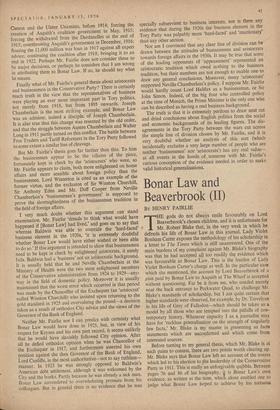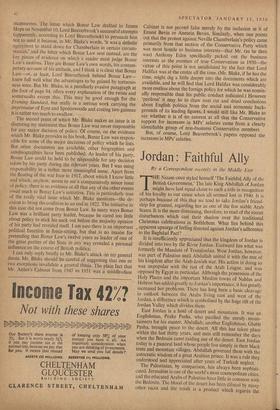Bonar Law and Beaverbrook (II)
BY HENRY FAIRLIE HE gods do not always smile favourably on Lord Beaverbrook's chosen children, and it is unfortunate for Mr. Robert Blake that, in the very week in which he defends his life of Bonar Law in this journal, Lady Violet Bonham Carter exposes the methodology of his scholarship in a letter to The Times which is still unanswered. One of the main burdens of my complaint against Mr. Blake's biography was that he had accepted all too readily the evidence which was favourable to Bonar Law. This is the burden of Lady Violet Bonham Carter's charge as well. In the particular case which she mentioned, the account by Lord Beaverbrook of a visit paid by Bonar Law to Asquith at The Wharf is accepted without questioning. Far be it from me, who resided merely near the back entrance to ?eckwater Quad, to challenge Mr. Blake's standards of scholarship, but I am quite certain that higher standards were observed, for example, by Dr. Trevelyan in his life of Grey of Fallodon—which should be taken as a model by all those who are tempted into the pitfalls of con- temporary history. Whatever capacity I as a journalist may, have for 'reckless generalisation on the strength of singularly few facts,' Mr. Blake is my master in ;presenting as facts statements which are unconfirmed and which come from interested sources.
Before turning to my general thesis, which Mr. Blake is at such pains to contest, there are two points worth clearing up. Mr. Blake says that Bonar Law left no account of the events which led to his election to the leadership of the Conservative Party in 1911. This is really an unforgivable quibble. Between pages 76 and 86 of his biography, it is Bonar Law's own evidence, as written at the time, which alone enabled one to judge what Bonar Law hoped to achieve by his tortuous manoeuvres. The letter which Bonar Law drafted to James Hope on November 10, Lord Beaverbrook's successful attempts (apparently, according to Lord Beaverbrook) to persuade him not to send it because, in Mr. Blake's words, 'it was a definite agreement to stand down for Chamberlain in certain circum- stances,' and the letter which Bonar Law sent instead, are the key pieces of evidence on which a reader must judge Bonar Law's motives. They are Boner Law's own words, his contem- porary account of his attitude, and I think it is clear that Boner Law—or, at least, Lord Beaverbrook behind Bonar Law— knew full well what the advantages to be gained by tortuous- ness were. But Mr. Blake, in a peculiarly evasive paragraph at the foot of page 84. offers every explanation of the twists and somersaults except this. This may be good enough for the Evening Standard, but really in a serious work carrying the imprimatur of Eyre and Spottiswoode and costing two guineas it is rather too much to swallow.
The second point of which Mr. Blake makes an issue is in disputing my statement that Bonar Law was never responsible for any major decision of policy. Of course, on the evidence which Mr. Blake provides in his book, Bonar Law was respon- sible for some of the major decisions of policy which he lists. But other documents are available, other biographies and autobiographies have been published. As leader of his party, Bonar Law could be held to be responsible for any decision taken by his party during the relevant years. But I was using responsibility in a rather- more meaningful sense. Apart from the floating of the war loan in 1917, about which I know little and which, anyhow, seems to me a comparatively minor issue of policy, there is no evidence at all that any of the other events owed much to Bonar Law's initiative. This is particularly true of the really vital issue which Mr. Blake mentions—the de- cision to bring the coalition to an end in 1922. The initiative in this case did not come from Bonar Law. In many ways Bonar Law was a brilliant party leader, because he cared too little about policy to stick his neck out before the majority opinion of his party had revealed itself. I am sure there is an important political function in fence-sitting, but that is no reason for pretending that Bonar Law's twelve years as leader of one of the great parties of the State in any way revealed a personal influence on the course of British politics.
I can only reply briefly to Mr. Blake's attack on my general thesis. Mr. Blake should be careful of suggesting that one or two exceptions invalidate a general thesis. The plain fact that Mr. Attlee's Cabinet from 1945 to 1951 was a middle-class Cabinet is not proved false merely by the inclusion in it of Ernest Bevin or Aneurin Bevan. Similarly, when one points out that the protest against Neville Chamberlain's policy came primarily from that section of the Conservative Party which was most hostile to business interests—that Mr. (as he then was) Anthony Eden specifically picked out the business interests as the enemies of true Conservatism in 1930—the virtue of this point is not invalidated by the fact that Lord Halifax was at the centre all the time. (Mr. Blake, if he has the time, might dig a little deeper into the documents which are available, and he will find that Lord Halifax was considerably more restless about the foreign policy for which he was nomin- ally responsible than his public conduct indicated.) However `perilous' it may be to draw neat cut and dried conclusions about English politics from the social and economic back- grounds of its leading figures, I would still like Mr. Blake to say whether it is of no interest at all that the Conservative support for increases in MPs' salaries came from a clearly identifiable group of non-business Conservative members.
But, of course, Lord Beaverbrook's papers opposed the increases in MPs' salaries.



































 Previous page
Previous page